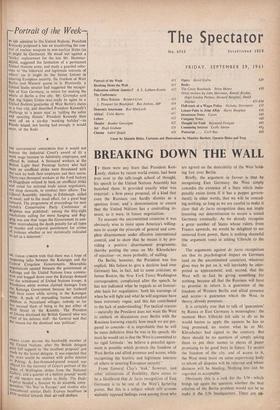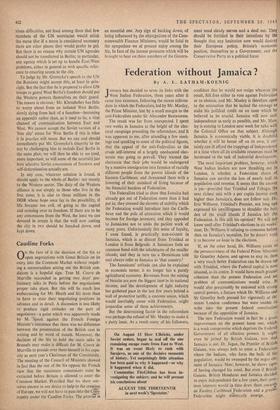BREAKING DOWN THE WALL I F there were any fears that
President Ken- nedy, shaken by recent world events, had been won over to the talk-tough school of thought, his speech to the United Nations Assembly has banished them. It provided exactly what was required : a firm peace proposal, of a kind that even the Russians can hardly dismiss as a spurious front; and a determination to ensure that the United Nations has a controlling in- terest, as it were, itt future negotiations.
To reassure the uncommitted countries it was obviously wise to insist upon America's willing- ness to accept the principle of general and com- plete disarmament under effective international control, and to show that he meant it by pro- viding a positive disarmament programme, thereby putting the onus on Mr. Khrushchev of rejection—or, more probably, of stalling.
On Berlin, however, the President was less explicit. His failure to give a decisive lead over Germany has, in fact, led to some criticism; as James Reston, the New York Times Washington correspondent, complained after the speech, he has not indicated what he regards as an honour- able basis for negotiation; 'both his warnings of when he will fight and what he will negotiate have been extremely vague, and this has contributed to the lack of understanding.' For tactical reasons —naturally the President does not want the West to embark on discussions over Berlin with the Russians knowing exactly how much we are pre- pared to concede—it is improbable that he will be more definitive than he was in his speech; the most he would say is that the West is committed to no rigid formula : 'we believe a peaceful agree- ment is possible which protects the freedom of West Berlin and allied presence and access, while recognising the historic and legitimate interests of others in assuring European security.'
From General Clay's 'leak,' however, and other intimations of flexibility, there seems to be a likelihood that de facto recognition of East Germany is to be one of the West's bartering points. But this is a subject which still arouses violently opposed feelings, even among those who are agreed on the desirability of the West hold- ing fast over Berlin.
Briefly, the argument in favour is that by recognising East Germany the West simply concedes the existence of a State which indis- putably exists (even if it has a puppet govern- ment); in other words, that we will be conced- ing nothing, so long as we are careful to make it clear tha't de facto recognition does not imply lessening our determination to secure a united Germany eventually. As we already recognise a great number of States whose rulers, from Franco upwards, we would be delighted to see removed from power, there is nothing shameful (the argument runs) in adding Ulbricht to the list.
The arguments against de facto recognition are that its psychological impact on Germans (and on the uncommitted countries), whatever gloss may be put on it, will inevitably be inter- preted as appeasement; and, second, that the West will in fact be giving something for nothing, because all that the Russians will have to promise in return is a guarantee of the freedom of Western Berlin and allied presence and access—a guarantee which the West, in theory, already possesses.
It is certainly true that to talk of 'guarantees' by Russia or East Germany is meaningless : the moment Herr Ulbricht felt safe' to do so he would hasten to apply the squeeze he has so long promised, no matter what he or Mr. Khrushchev had signed to the contrary. But there should be no question of simply asking them to put their names to pieces of paper promising to be good boys in future. To secure the freedom of the city, and of access to it, the West must insist on some supervisory body to ,whom all disputes will be referred and whose decision will be binding. Nothing less can be regarded as acceptable.
Obviously this is a task for the UN—which brings up again the question whether the best solution of the Berlin problem would not be to make it the UN headquarters. There are :vious difficulties, not least among them that few members of the UN secretariat would relish the move (for if a move is considered necessary there are other places they would prefer to go). But there is no reason why certain UN agencies should not be transferred to Berlin; in particular, any agency which is set up to handle East/West problems, either in general or with specific refer- ence to ensuring access to the city.
To judge by Mr. Gromyko's speech to the UN the Russians might accept this, at least in prin- ciple. But the fact that he is prepared to allow UN troops to guard West Berlin's freedom should put the Western powers themselves on their guard. The reason is obvious : Mr. Khrushchev has little to worry about from an isolated West Berlin, slowly dying from lack of a function—becoming an appendix rather than, as it used to be, a vital channel of communication between East and West. We cannot accept the Soviet version of a 'free city' status for West Berlin if this is what it in practice will mean. But we can and should immediately put Mr. Gromyko's sincerity to the test by challenging him to include East Berlin in the same plan; we will then be able to see (and, more important, so will some of the neutrals) just how selective Soviet concessions of freedom and self-determination actually are.
In any case, whatever solution is found, it should apply to the whole of Berlin : not merely to the Western sector. The duty of the Western alliance is not simply to those who live in the free zone; it is also to those millions in the DDR whose hope once lay in the possibility, if life became too evil, of going to the capital and crossing over to freedom. If there are to be any concessions from the West, the least we can demand in return is that the wall now cutting the city in two should be knocked down, and kept down.







































 Previous page
Previous page